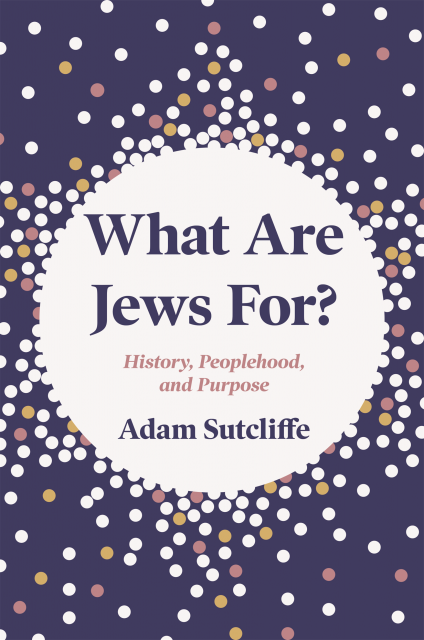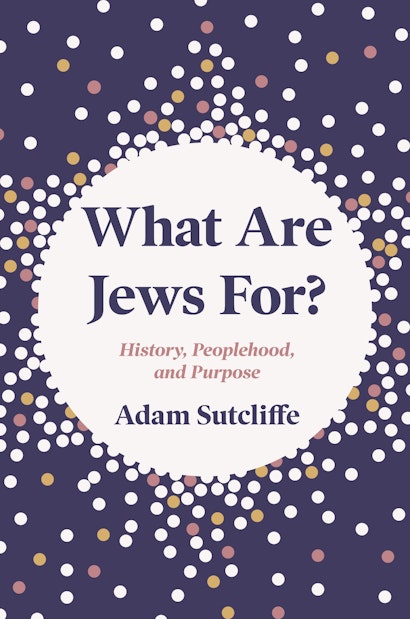What is the purpose of Jews in the world? The Bible singles out the Jews as God’s “chosen people,” but the significance of this special status has been understood in many different ways over the centuries. What Are Jews For? traces the history of the idea of Jewish purpose from its ancient and medieval foundations to the modern era, showing how it has been central to Western thinking on the meanings of peoplehood for everybody. Adam Sutcliffe delves into the links between Jewish and Christian messianism and the association of Jews with universalist and transformative ideals in modern philosophy, politics, literature, and social thought.
‘What Are Jews For?’: Isn’t that a rather odd question to ask?
AS: The question of Jewish purpose seems jolting today, but it has been posed insistently and in many different guises throughout Western history, by Jews and non-Jews. Both the early rabbis and medieval Christian theologians believed that the Jews would play a crucial role in heralding the advent of the messianic age. In the modern era this messianic expectancy has been reworked into innumerable secular forms. Jews have repeatedly been regarded as playing a special role in the political, philosophical, economic, sociological and cultural transformation of the world. The association of Jews with these transformations has given rise to much confusion, antagonism and hatred—but it has also often been seen in highly positive terms. Jews have in many different ways presented themselves, and been presented by others, as leading the world toward a better future in which human divisions will finally be overcome. The persistent importance of the idea of Jewish purpose has been largely unrecognized. It is fundamental, though, to how we approach thinking about the role and purpose of all of us—Jewish or not—in the building of a better future.
Isn’t it inappropriate, though, or even antisemitic, to single out Jews as having a special purpose in the world?
AS: The complexities of ‘singling out’ lie at the heart of Judaism. In the biblical covenant God singles out the Jews as a ‘chosen people’, and much of the Jewish tradition is devoted to puzzling out what that means. In the nineteenth century Jews, Christians and also most secularists overwhelmingly agreed that Jews played a very special role in human affairs, and many rabbis, particularly in the Reform movement, assertively proclaimed a unique Jewish mission to others as beacons of ethics and spiritual wisdom. The horror of the Holocaust cast a chill over these arguments. The idea of Jewish exceptionality seemed to have culminated in exceptional slaughter, to which many responded by insisting on the normalization of the place of Jews in the world. While this desire remains very powerful today, it has not overpowered the association of Jews with a particular collective purpose. With its deep biblical roots and intricately layered history, this idea retains an inescapable presence in Western culture.
Your book explores those religious foundations of what you call ‘the Jewish purpose question’, but you focus on tracing the historical unfolding of the question over the past four centuries. Why did you concentrate on that timespan?
AS: Medieval Jews and Christians developed related but sharply distinct conceptions of the purpose of Jews in the world. After the Protestant Reformation, though, these debates cross-fertilized. My book examines how, from approximately 1600, the idea of Jewish purpose has functioned as an increasingly multi-layered cross-cultural node in the intellectual life of the Western world. In the political theology of the seventeenth century the messianic significance of the conversion of the Jews to Christianity played a prominent role. In the eighteenth-century Enlightenment this expectancy was recast in philosophical terms, with the political ‘emancipation’ of Jews in the aftermath the French Revolution imbued with greatly heightened significance. Since the nineteenth century Jews have been widely regarded as key agents and apostles not only of future transformations, but of the most dramatic forces and values jostling to shape the present: capitalism, anti-capitalist political radicalism, transnational cosmopolitanism, universalist ethics, objective science, collective cohesion and commitment, and individual resilience and self-knowledge.
Why is ‘peoplehood’ such an important strand in your book, and what is its relationship to Jewish purpose?
AS: Jewishness is defined by peoplehood—unlike, for example, being Christian, which is defined by belief. Western notions of peoplehood, and of national purpose, have been fundamentally shaped by the Jewish example—and Jews have in various ways presented themselves as exemplary of collective belonging. This is most pronounced, and most conflicted, in the history of Zionism. The idea that a Jewish state should make a unique contribution to the world has resonated widely: Israel has often been vaunted, using the words of the prophet Isaiah, as ‘a light unto the nations’. There is a powerful counter-tradition in Jewish thought, though, which has presented Jews as exemplary in their aloofness from politics and from land, being bound together, as Franz Rosenzweig put it, by blood alone. Jews, and the prophetic voices of the Jewish Bible, have featured prominently in universalistic aspirations to transcend the divisions of nationalism.
In America Jews have seemed to escape the discomfort of uniqueness, seeking instead integration and normalization. The notion of their special purpose has, however, in various ways been reconceived in terms of their exemplary role in American multicultural citizenship.
Jews are the quintessential minority group in Western history. The Jewish purpose question has therefore become the richest and most influential repository of thinking on the relationship of any particular group of people to the betterment of the world as a whole.
What’s the significance of Jewish purpose in our contemporary world?
AS: In recent decades, two competing conceptions of Jewish purpose have been locked in intensifying conflict. The outward-looking version, emphasizing the Jewish role in advancing cosmopolitanism and universalism, stands against an inward-looking version that stresses the responsibilities of Jews to other Jews. This conflict has been particularly bitter in relation to Zionism. The ‘light unto the nations’ idealism of earlier Zionist rhetoric has over the past five decades lost considerable ground to a sharply particularist and ethno-nationalist vision of Jewish collective purpose. A similar cleavage between outward-looking and inward-looking conceptions of national identity has in recent years widened in many countries, including in Brexit-riven Britain and the United States under Donald Trump. The politics of Jewish purpose matters today, and attracts so much attention, because it reflects in stark microcosm the most fundamental disputes and divisions across the contemporary world.
So … What are Jews for?
AS: My book is a historical exploration of the lineages of the Jewish purpose question, rather than an attempt to offer a fresh answer to it. If the many answers given over the past four centuries and beyond can be distilled to one word, though, then the choice is clear. Jews are for hope. The idea of Jewish purpose, from its covenantal and messianic roots to its diverse and contested twenty-first-century iterations, focuses attention beyond the present, and toward a future that will be in some way better than our present. Hope for the future is essential for any sense of meaning in human life. The Jewish purpose question, in insistently prompting reflection on how a people can and must contribute to bringing about a better world, keeps collective hope to the fore. In our current pandemic, which has placed our hopes for the future under severe strain, these resources for looking forward are as important as ever.
Adam Sutcliffe is professor of European history at King’s College London. He is the author of Judaism and Enlightenment and the coeditor, most recently, of Philosemitism in History, The Cambridge History of Judaism: The Early Modern World, and History, Memory and Public Life: The Past in the Present.

